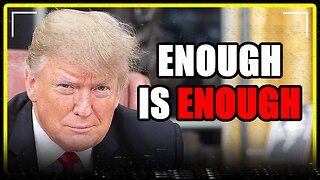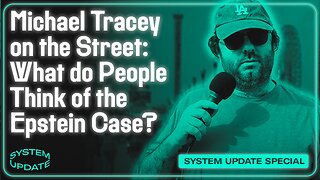Premium Only Content

The Revolution Will Not Be Televised (2003) Hugo Chavez Documentary
The Revolution Will Not Be Televised (Spanish: La revolución no será transmitida), also known as Chávez: Inside the Coup, is a 2003 Irish documentary film. It focuses on events in Venezuela leading up to and during the April 2002 coup d'état attempt, which saw President Hugo Chávez removed from office for two days. With particular emphasis on the role played by Venezuela's private media, the film examines several key incidents: the protest march and subsequent violence that provided the impetus for Chávez's ousting; the opposition's formation of an interim government headed by business leader Pedro Carmona; and the Carmona administration's collapse, which paved the way for Chávez's return. The Revolution Will Not Be Televised was directed by Irish filmmakers Kim Bartley and Donnacha Ó Briain. Given direct access to Chávez, the filmmakers intended to make a fly-on-the-wall biography of the president. They spent seven months filming in Venezuela, following Chávez and his staff and interviewing ordinary citizens. As the coup unfolded on 11 April, Bartley and Ó Briain filmed on the streets of the capital, Caracas, capturing footage of protesters and the erupting violence. Later, they filmed many of the political upheavals inside Miraflores, the presidential palace.
Bartley and Ó Briain conceived of the film after Bartley returned from documenting the aftermath of the 1999 Vargas mudslides for an Irish charity. Following a visit to Venezuela to determine the feasibility of a film project, the pair formed a production company and applied to Ireland's film board, Bord Scannán na hÉireann (BSÉ), for a development grant. At BSÉ's request, the filmmakers partnered with a more experienced producer and shot a short pilot to show to potential investors. Funding for the €200,000 production was provided by BSÉ and several European broadcasters. Bartley and Ó Briain shot more than 200 hours of material; editing focused on identifying footage that would make the film entertaining and drive the plot. It was at this stage that the film's coverage narrowed to concentrate more on the coup attempt.
The film was positively received by mainstream film critics and won several awards. Reviewers cited the filmmakers' unprecedented proximity to key events and praised the film for its "riveting narrative";[1] criticism focused on its lack of context and pro-Chávez bias. First shown on television in Europe and Venezuela in 2003, The Revolution Will Not Be Televised later appeared at film festivals and secured a limited theatrical release on the art house circuit. Independent activists held unofficial screenings, and Venezuelan government officials encouraged its circulation to build support for Chávez's administration. The film is regularly shown on Venezuelan television, and in the capital it is often broadcast during "contentious political conjunctures".[2] The Revolution Will Not Be Televised paints Chávez in a favorable light,[3][4] which has led to disputes over its neutrality and accuracy; particular attention is paid to its framing of the violence of 11–13 April, the filmmakers' editing of the timeline, and the omission of incidents and personnel. The film is variously cited as an accurate portrayal or a misrepresentation of the events of April 2002.
This video is being posted for archival purposes only. Its content is preserved to maintain a historical record and provide access for future reference and research.
Please note that this video may contain information, views, or expressions that are reflective of the time it was originally recorded and may not align with current standards or perspectives. The inclusion of this video in our archives does not imply endorsement or agreement with the content presented.
Additionally, this video may be protected by copyright law. It is provided here under fair use for educational, non-commercial, and historical preservation purposes. If you are a copyright holder and believe this video should not be archived in this manner, please contact us to discuss the matter.
-
 8:07
8:07
MattMorseTV
3 hours ago $0.13 earnedTrump just LOWERED PRICES by 75 PERCENT.
4.77K15 -
 LIVE
LIVE
Misfit Electronic Gaming
6 hours ago"LIVE" "Blind Descent' +"Dollhouse of Dead" Playtest 10 Followers till we hit 1000! We CAN do this!
67 watching -
 21:53
21:53
Glenn Greenwald
5 hours agoMichael Tracey on the Street: What Do People Think of the Epstein Case?
98.1K52 -
 LIVE
LIVE
megimu32
2 hours agoOTS: Board Games Gone Wild! The Loud, Weird & Chaotic Games That Raised Us
129 watching -
 LIVE
LIVE
DamnDanieI
2 hours agoKill First, Loot Later – OTG Live
268 watching -
 56:41
56:41
Donald Trump Jr.
7 hours agoLies, Leaks, and Lawfare: Censorship Corruption Exposed | TRIGGERED Ep.263
126K107 -
 LIVE
LIVE
Precision Rifle Network
4 hours agoS4E25 Guns & Grub - Rex Is Back, I shot the 6.5PRC finally...
40 watching -
 LIVE
LIVE
rhywyn
1 hour agoうつ
33 watching -
 LIVE
LIVE
RyuMuramasa✧
3 hours agoNEW Everdark Sovereign | Elden Ring Nightreign | LIVE Playthrough
33 watching -
 1:17:04
1:17:04
Nikko Ortiz
10 hours agoLive - News, Politics, Podcast And Naaah Im Playin We Chillen
3.3K